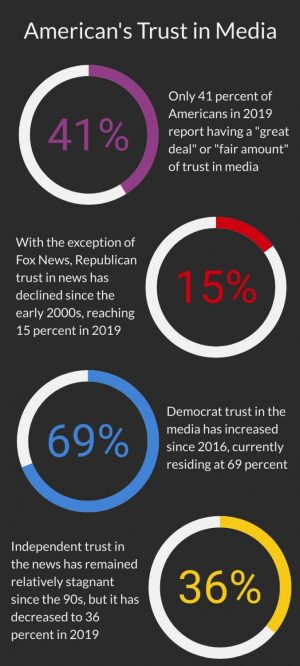A journalist’s take on fake news
Media bias has always been a part of the American story, but it doesn’t have to be that way

Especially now, when the media is seen as an unreliable source, it imperative for the next generation of reporters to be committed to the truth. Graphic by Bella Russo.
November 16, 2019
Trump revokes press credentials of multiple news outlets!
McDonalds employee sneaks mixtape in Happy Meals!
Former first daughter Malia Obama expelled from Harvard!
What do all of these shocking reveals have in common? They’re completely made up, but all of them were published online in recent years. While it may sometimes be easy for the trained eye to spot fake news, its frequency has very clearly eroded public faith in journalism.
Distrust in the accuracy of news reporting is definitely not a new concept. Historically, Americans lost faith in the media during and after significant political events, such as during the World Wars or the Great Depression.

Modern American’s trust in the media, information by Gallup Polls in 2019. Graphic by Kristen Tibbetts.
More recently, however, a Gallup Poll reported that confidence in the media hit an all-time low in September of 2016 when only 32 percent of Americans stated that they had at least “a fair amount” of trust in the press. Even though this number has increased to 41 percent since then, the majority of Americans still do not have faith in the news. For student journalists and aspiring reporters like me, this comes as a devastating blow.
When I was first old enough to access the internet, I was too lazy to read any news articles, but I loved to look through headlines. Whenever I came across anything particularly interesting, I would run to my mom and proudly announce that I knew a cool new fact.
“Not everything you read online is true,” she would remind me, suggesting that I look up the article’s sources before believing a word of it.
More often than not, I met her response with an eye roll. Even before I made up my mind about pursuing a career in journalism, I desperately wanted to trust the media. If it was their job to provide the public with facts, why is unreliability so common?
Even though modern technology plays a significant role, a pattern of media bias and even inaccuracy can be seen throughout U.S. history.
For example, The New York Gazetteer, a pre-independence newspaper run by known Loyalist James Rivington, was notorious for its unapologetic pro-Britain bias. The bias was so upsetting to the public that in response, an angry mob hung an effigy of Rivington and in 1775, the Sons of Liberty attacked his home and office. In light of such attacks on the press, it is no wonder that freedom of the press was adopted in 1791 with the ratification of the Bill of Rights, allowing reporters to publish information and opinions with protection of the law.
While bias is historically common in U.S. media and becoming more acceptable (as long as the venue does not try to hide it), inaccuracy in the media is dangerous and should never be tolerated. In 1917, attempting to rally support for the Allied Powers in World War I, multiple British newspapers reported that Germany had a “corpse factory” for processing their deceased soldiers.
Aside from being untruthful, this propaganda led many to mistrust early media reporting of the Holocaust a few decades later. More recently, in 1981, Janet Cooke, a writer for The Washington Post, admitted to completely fabricating her Pulitzer Prize-winning story about an 8-year-old heroin addict. She was immediately stripped of her award, lost her job and has not been able to find another in the field.
If it is obvious that journalistic integrity is essential, why is fake news spread so easily? I believe it is a combination of modernization and the sheer size of the current journalism field. It can be argued that a lot of the media today is focused more on entertainment than on information, especially with the rise of technology and “click-bait” headlines.
Many publications play into a sort of shock factor, trying to amaze their audience with headlines just outlandish enough to merit a click. As a result, many people treat the media as a source of entertainment rather than news, ignoring stories they don’t agree with and quickly accepting ones that support an opinion they already hold.
While I wouldn’t go as far as to say that many people choose to only believe the news they want to hear, I know that I, for one, am guilty of listening to what is most convenient for me to hear. I often catch myself scrutinizing the credibility of a news report from an opposing viewpoint while quickly accepting political stories that my friends share on social media.
As a future journalist, I take this as a challenge. Especially now, when the media is seen as an unreliable source, it imperative for the next generation of reporters to be committed to the truth. Journalism will never stop being important. No matter how turbulent the political climate gets, freedom of the press is written into our constitution for a reason. Even though many reporters and publications have taken this right too far by publishing false information or presenting a biased report as straight fact, demand for the truth will never die out.







